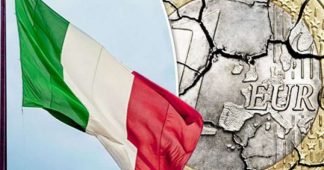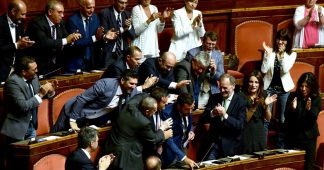Italy’s new coalition government has sacrificed the populist revolt at the altar of the EU
By Thomas Fazi
4th October 2019
Italy’s proverbially surreal politics reached new heights last month when the country, over the course of a few weeks, went from having ‘the most populist government in Europe’ – an unlikely alliance between two very different ‘anti-establishment’ parties, the ‘neither-left-nor-right’ Five Star Movement (Movimento Cinque Stelle, M5S) and the right-wing, Eurosceptic League (Lega) – to having a vehemently pro-establishment one, as the M5S reached an agreement to form a new government with the pro-EU, liberal-centrist Democratic Party (Partito Democratico, PD), after League leader Matteo Salvini suddenly pulled the plug on the previous administration. And all without even replacing the incumbent prime minister, the independent law professor, Giuseppe Conte.
Though Salvini’s move caught everyone by surprise – especially given the timing, right in the middle of the summer holidays – it wasn’t entirely unexpected. For the first six months, the M5S-League alliance had indeed seemed to work, despite, or possibly because of, the differences between the two parties. Their economic policies, for example, were quite dissimilar: the League’s broadly market-oriented, supply-side-based (hence its flagship proposal of an ambitious Trump-style tax cut, inappropriately called ‘flat tax’); the M5S’s more interventionist, demand-side-based. Nevertheless, one could argue that if it hadn’t been for the League’s laxer approach to budgetary policy (and vocal opposition to Brussels’ budget rules), as opposed to its partner’s more rules-abiding and conflict-averse attitude towards the EU, which was scarcely compatible with M5S’s policy aims, it would have had a hard time selling its costly income-support scheme, the so-called reddito di cittadinanza.
The end of the honeymoon
Beginning in early 2019, however, the differences between the two parties increasingly went from being complementary to being mutually exclusive. On one hand, Salvini, spurred by his relentless rise in the polls, became increasingly vocal about the need to raise the fiscal deficit in order to implement his proposed ‘flat tax’; on the other hand, an increasingly overshadowed and unfocused M5S – in a questionable attempt to counter Salvini’s growing monopoly over the government’s agenda-setting, particularly on the issue of migration – started placing a greater emphasis on the need for Italy to comply with the EU’s strict budgetary framework, effectively vetoing the League’s tax cut. The situation was further exacerbated by the opening of an excessive deficit procedure against Italy by the European Commission (EC), which, rather ludicrously, accused Italy of being ‘in serious non-compliance’ with the Stability and Growth Pact’s fiscal rules.
These tensions came to a head in the run-up to the European election, during which the M5S leader Luigi Di Maio, in an equally questionable move, lashed out at Salvini and the League for a corruption scandal that had emerged within the League’s party ranks, in an attempt to peel some votes away from the latter. As we know, the strategy didn’t work, with the election resulting in a landslide for the League, which won 34 per cent of the votes, and a crushing defeat for the M5S, which lost six million votes compared to the previous year’s national election. From that moment on, things started going downhill for the increasingly tenuous government alliance.
Salvini – further galvanised by his electoral triumph – increased his pressure on the recalcitrant economic minister Giovanni Tria to make room for the League’s tax cut in the new budget law for 2020 and to ignore Brussels’ calls to rein in the deficit. The M5S, buttressed by prime minister Giuseppe Conte, took to Tria’s defence and reaffirmed the need to heed Brussels’ demands. Then, in early July, Tria, without consulting either party (as far as we know), sent a letter to the EU pledging to reduce Italy’s deficit and committing the country to further austerity. The next day the European Commission closed its excessive deficit procedure. This was an almost exact replay of the events that had occurred in late 2018, when the government submitted its 2019 draft budget to the Commission for review. Even then, the Commission had rejected the government’s planned deficit of 2.4 per cent and threatened to activate an excessive deficit procedure. After much posturing by the Italian authorities, the government partially caved in to the Commission, agreeing to a deficit target of 2.04 per cent for the coming year.
This time round, though, Salvini hadn’t been humiliated just by the European Commission, but also by his coalition partner and economic minister, who started openly to criticise the League’s tax plan as well. The rift between the two parties became apparent in mid-July, when the M5S voted in favour of the German candidate for the presidency of the European Commission, Ursula von der Leyen – former German defence minister, member of Angela Merkel’s party and unrepentant austerity hawk (in 2011, she controversially suggested that Greece put up its gold reserves as collateral to its bailout loans) – while the League, in what in hindsight appears as a calculated move, voted against. According to M5S MEPs, the League broke an agreement reached by both parties to vote for von der Leyen.
The vote drew the two parties further apart from each other, with Salvini accusing the M5S of bowing down to Germany and France, and betraying its Eurosceptic roots. Shortly thereafter, in early August, Salvini officially opened the government crisis by calling for a snap election that would have surely granted him a sweeping majority. Except that things didn’t go as he had planned: in an equally surprising turn of events, a few weeks into the crisis the M5S announced that it would be forming a new government with its arch enemy, the Democratic Party.
The League: more than meets the eye
Based on the aforementioned account, in which I took the two parties’ public statements at face value, the reader would be justified in placing the lion’s share of the blame for the split on the M5S’s ‘sell-out’ to Brussels. This is certainly the narrative Salvini has been peddling ever since. Now, there is little doubt that, since it has entered government, the M5S has swiftly shed its ‘populist’ edge in favour of a more ‘responsible’ and ‘institutional’ attitude – particularly with regard to the EU (just a few years ago it was campaigning for a Euro-exit) – probably in a naive attempt to get in the establishment’s good graces. But the League’s ‘anti-Euro’ and ‘anti-austerity’ credentials deserve to be called into question, too.
Indeed, there is good reason to doubt that Salvini’s anti-Brussels posturing is anything more than just that. It has certainly played a crucial role, along with Salvini’s tough stance on immigration, in transforming the League from a strictly regionalist party focused almost exclusively on the attainment of greater autonomy (if not outright secession) for the regions of northern Italy (referred to as ‘Padania’) – hence its original name Northern League – into the No1 party in the country, by catalysing the widespread disaffection for the EU, particularly in the more crisis-hit regions of southern Italy. But the ‘Padanian’ faction of the League has no interest in breaking with the EU. Its support comes from the small and large export-oriented industries of northern Italy, which are fully integrated in the European (ie, German) value chain, and actually benefit from the EU-driven policies of wage compression – and their local representatives, the powerful presidents of regions such as Lombardy, Veneto and Friuli-Venezia Giulia, still hold considerable sway within the party.
To give an idea of just how split the party is over the issue, one of the League’s heavyweights, Roberto Maroni – former party leader and former president of Lombardy – recently called for the creation of a federal Europe. Indeed, even the League’s law proposal to grant greater autonomy to the northern regions – which was blocked by the Five Star Movement shortly before the break-up – is very much in line with the EU’s long-standing regionalisation strategy, which aims to create an ever-more-direct relationship between the continent’s various regions (and so-called ‘macro-regions’), and the EU’s institutions, thus bypassing (and further disempowering) the national governments. A fact that doesn’t square very well with the party’s allegedly ‘sovereignist’ credentials.
This may explain the League’s somewhat schizophrenic attitude during its year-long coalition government with the Five Star Movement. For example, the League’s controversial idea of issuing so-called ‘minibot’ state bonds to pay the debts held by the public sector with its private suppliers – which was initially put forward by the its economic spokesman Claudio Borghi – was dashed by none other than another prominent member of the League, Giancarlo Giorgetti, former secretary of the Council of Ministers in the M5S-League government, and a representative of the pro-European wing of the party. It also may explain why Salvini, who took issue with the M5S over pretty much everything, from migrants to the Turin–Lyon high-speed railway, never publicly raised the issue of his coalition partner’s excessive deference to Brussels. Finally, one may legitimately doubt how serious the League was about its much-vaunted ‘flat tax’, since no concrete proposal was ever put forward (with estimates of the bill’s overall cost ranging anywhere from 10 to 60 billion Euros).
The Euro’s anti-democratic ‘convention’
Regardless of the League’s true strategy vis-à-vis Europe (assuming it actually has one), it seems quite clear that Salvini was reluctant to rubber-stamp a budget bill that was shaping up to be rather austere and which would surely have been incompatible with any substantial tax cut. This point merits a wider reflection. The fact that an elected government can unravel because, among other reasons, it is effectively barred by the European authorities from running the deficit that would be necessary to implement its platform – the ‘flat tax’ was one of the points of the ‘government contract’ agreed upon by the League and M5S – is a clear demonstration of the serious limits placed on democratic politics by the Maastricht architecture, and the way in which the latter breeds political instability.
Simply put, the fact that Italy, like other Eurozone countries, lacks all the ‘normal’ instruments of economic policy – namely monetary, fiscal and exchange-rate policy – means that any government (‘populist’ or not) inevitably finds itself lacking the basic tools necessary to kickstart the economy and maintain societal consensus. This is particularly difficult in a context of deep socioeconomic crisis, such as the one Italy has been mired in for at least a decade, which calls for strongly expansionary policies that are incompatible with Euro membership. As Fritz W Scharpf, former director of the Max Planck Institute for the Study of Societies, writes, in countries such as Italy monetary union hasn’t simply entailed huge socioeconomic costs – it has also had ‘the effect of destroying the democratic legitimacy of government’.
In this regard, it may be useful to recall how Giovanni Tria – an economist with an utterly mainstream pedigree – ended up being the economic minister of a so-called ‘populist’ government. Readers might remember that the name initially put forward by the two parties during the formation of the government was that of economist Paolo Savona. However, despite a more than respectable curriculum vitae – his previous positions included director-general of Confindustria, Italy’s business federation, and minister of industry in Ciampi’s pro-European government in the 1990s – Savona was vetoed by the Italian president Sergio Mattarella due to his excessively Euro-critical stance. It should be noted that the articles and speeches that got Savona into trouble were far from incendiary: Savona simply claimed that unless the Eurozone evolves into a fully fledged fiscal union, it will likely disintegrate, in which case all countries, including Italy, should have a contingency plan in place, including for a unilateral Euro-exit – a position shared by countless economists and policymakers, including various Nobel Prize winners.
Mattarella, however, harboured a different view. According to law experts Marco Dani and Agustín José Menendez, it is a view that reveals ‘the democratic limits of the European constitutional architecture and institutional culture’ and ‘the constraints imposed by EU membership on the operation of national constitutional democracies’ – constraints that are often much subtler than more obvious ones such as the lack of monetary sovereignty and harsh spending rules. Mattarella explicitly claimed that Savona’s doubts concerning the sustainability of the Eurozone in its current fashion disqualified him, given that the very act of his appointment could increase the cost of borrowing for the Italian Treasury (the infamous ‘spread’). He claimed this would ‘constitute real risks for the savings of our fellow citizens and for Italian families’. As argued by Dani and Menendez, Mattarella’s decision would seem to point to the existence of:
‘a form of “convention” (functionally equivalent to a constitutional convention) according to which political parties or coalitions that are critical of the existing economic and monetary arrangements within the Eurozone cannot get into government. Or, more accurately, they are entitled to govern in a tamed form… Such a convention could be said to be a renovated form of ‘pactum ad excludendum‘, only this time it would not be the Communists, but those daring to be critical of European economic government arrangements, who would have to be prevented from holding power.’
Dani and Menendez note that the existence of such a convention – which ‘not only lacks any form of democratic legitimacy, but amounts to a decisive limit to the existing procedures of democratic will-formation’ – ‘amount[s] to a radical undermining of national and European constitutional law’. Mattarella effectively prioritised Italy’s continued adherence to the Eurozone, despite the enormous social and economic costs this entails, over the fundamental values and principles enshrined in Italy’s national constitution, which the president is theoretically there to uphold, given that the golden fetters of the Euro de facto render impossible the task of removing the obstacles to the realisation of substantive equality as prescribed by the constitution. It is a telling demonstration of the extent to which Euro membership has deeply transformed not only Italy’s form of government, but even its very constitutional state form, as it would appear that the primary role of the Italian president has now become that of safeguarding the integrity of the EU, whatever the cost.
This became apparent during the term of the previous president, Giorgio Napolitano, who conspired with foreign governments and EU institutions to have then prime minister Silvio Berlusconi removed from office and replaced with the technocrat Mario Monti. Legal and ethical considerations aside, this ‘convention’ is also politically toxic, as Salvini’s ascent testifies. ‘[M]aking national governments safe for the irreversibility of the Euro might buy some time for the present economic and monetary union’, write Dani and Menendez, ‘but only at the price of further accelerating the accrual of conditions that favour the emergence of extremely radical policy proposals that would throw out not only the dirty water of a deeply malfunctioning economic and monetary union, but also the baby of the democratic and social Rechtsstaat’.
In any case, whatever one thinks of Mattarella’s decisions, the point is that by appointing a man loyal to the EU to the most important government post of all, the Ministry of Economy and Finance, the president effectively put the M5S-League government into ‘controlled administration’ before it was even born. One could say that the government’s fate was sealed from that moment on. Especially if we consider that the economic minister – along with the director of the Treasury Department, who is himself appointed by the economic minister – is in charge of carrying out all the major economic negotiations with the EU through the ECOFIN (Economic and Financial Affairs Council) and the Eurogroup, over which the national parliament has little or no oversight. This goes to show how easily, by virtue of the aforementioned ‘convention’, a nominally ‘populist’ government can be pre-emptively neutralised in the Eurozone.
Democracy versus markets
This is not to mention the manner in which the bond markets were used to put pressure on the M5S-League government. Indeed, the election results had barely been announced when interest rates on Italian securities started to rise dramatically, as Mattarella had anticipated. This was presented in the media – and largely accepted by government officials – as a ‘natural’ consequence of the financial markets’ hostility to the new government. In fact, there was nothing natural about it. To the extent that Eurozone countries continue to be subject to the ‘market discipline’ of so-called bond vigilantes, this is uniquely a consequence of the flawed architecture of the Eurozone.
Simply put, in a country that issues its own currency, the central bank, as a buyer of last resort, can always set the interest on its government bonds regardless of the country’s deficit or debt levels, as Japan is demonstrating. There is little bond markets can do to put pressure on an elected government. In the Eurozone, however, the ECB also intervenes on the sovereign bond markets of member states through its quantitative-easing programme, but it does so on the basis of fixed quotas; it cannot boost its acquisitions of bonds for a specific country to quell market speculation. Or better, it can only do so through its Outright Monetary Transactions (OMT) programme, which entails ‘strict and effective conditionality’ such as that imposed on Greece and other countries – ie, austerity and neoliberal ‘structural reforms’ – explaining why no country has yet applied for an OMT programme. This would be politically unsustainable, for obvious reasons.
Furthermore, as the Italian case shows, not only is the ECB unable to protect countries from rising interest rates, but more often than not the European institutions actively (and, one must presume, deliberately) contribute to exacerbating market tensions, as the harsh pronouncements by Jean-Claude Juncker, Pierre Moscovici and others (including members of the ECB’s executive board) did in the aftermath of the formation of the M5S-League government. Thus, despite the various ‘unconventional’ measures undertaken by the ECB in recent years, Eurozone countries, unlike other advanced nations, continue to remain subject to ‘market discipline’. Indeed, EU budget commissioner Günther Oettinger even went as far as saying that he hoped ‘the negative development of the markets’ would provide ‘a signal to voters not to vote for populists on the right or left’ – a telling illustration of what Germans mean by ‘market-conforming democracy’.
The bottom line is that the M5S-League government crisis can only be understood against the backdrop of the restraints placed on democratic politics by Italy’s Euro membership. As I anticipated last year, the European institutions were to be expected to resort to a wide array of tools – first and foremost financial pressure – to constrain and, if necessary, disable the democratic responsiveness of the new government, which is exactly what happened.
The Five Star Movement: chronicle of a fiasco
Hitherto, I have mostly focused on the League. But recent events cannot be understood without analysing the profound Zelig-like transformation of the Five Star Movement. How could the anti-establishment party par excellence end up striking an alliance with the party that more than any other embodies that very establishment: the Democratic Party? And how did it manage to halve its ratings over the course of a single year in government? One explanation is more structural, the other more contingent.
From a structural point of view, the M5S could be said to be a victim of the very strategy that led to its astounding rise. Its allegedly ‘post-ideological’ approach – exemplified by the slogan ‘neither left nor right’ – proved extremely successful in rapidly building a mass support base covering the entire ideological spectrum, by re-articulating a broad range of issues, demands and grievances (environment, de-growth, social protection, the Euro) in a wider ‘chain of equivalence’, as Ernesto Laclau has it – namely that of the opposition between ‘honest citizens’ on the one hand and the corrupt political elites, or ‘casta’, on the other.
As Arthur Borriello, a researcher at the Université Libre de Bruxelles, writes, thanks to this, to its lack of any well-defined ideological identity and its focus on the ‘moral question’, the ‘M5S was able to create an ambiguous “big tent,” confounding any political conformity and extending its electoral appeal across wide swaths of alienated voters. At the same time, its original and innovative organisational strategy allowed it to mobilise and create a feeling of collective identification’. However, this also meant that the party never developed a coherent vision of an alternative society capable of challenging neoliberalism, let alone an accurate analysis of the genuine problems afflicting contemporary Western societies in general, and post-Maastricht Italy in particular, which, of course, extend well beyond the corruption of political elites. Indeed, M5S’s underlying leitmotif – the need to free the market from the ‘distortion’ of politicians and interest groups – could be said to suffer itself from a neoliberal bias.
Once in government, this proved disastrous: not only was its flagship slogan suddenly rendered unusable, but its leaders had now become the ‘casta’ they had long abhorred. But M5S’s lack of a clear identity (compounded by a relatively uncharismatic leadership), also meant that it was rapidly overshadowed by Salvini. Whereas the latter’s ‘social-neoliberal’ message was consistent – on immigration, taxes, pensions, public works, etc – M5S came across as contradictory and unfocused. It spoke of confiscating the national motorway company, Autostrade, from the Benetton family (following the deadly collapse of the Morandi bridge in Genoa, in August 2018, due to neglect), but on other occasions it defended the government’s non-intervention in market operations (such as the failed Fiat-Peugeot merger); it spoke of creating jobs, but its main proposition – the reddito di cittadinanza – consisted in little more than a form of means-tested unemployment benefit; it spoke of public investment, but was held back by its traditional distrust of big-spending infrastructure projects; it spoke of revamping the economy, but it had no concrete proposal for getting around Brussels’ fierce budget rules.
Furthermore, from a more contingent perspective, at some point the party made the decision to counter Salvini’s growing protagonism by presenting itself as the ‘responsible’ coalition partner. This only further alienated its electoral base.
Revenge of the elites
Over the course of the past year, the Five Star Movement thus underwent a deep process of ‘normalisation’. This, coupled with the prospect of a dramatic defeat in the case of new elections, set the stage for the unthinkable: an alliance with M5S’s historic enemy, the Democratic Party. As for the latter – severely battered in all recent elections (since 2006, it has shed over six million votes) and with a support base essentially limited to the affluent urbanite classes – an alliance with the M5S, which it had always vigorously disparaged, represented a unique opportunity to take back (at least temporarily) a power it thought it had lost forever. And to restore the status quo in the process. It is worth nothing that the PD embodies everything that citizens voted against in 2018: that perverse political alignment, common to other ‘extreme centre’ parties (such as Macron’s En Marche!), between political correctness (feminism, anti-racism, multiculturalism, LGBTQ rights, etc) on the one side, and ultra-liberal economics (anti-statism, fiscal austerity, deregulation, financialisation, etc), on the other, which US political scientist Nancy Fraser has aptly termed ‘progressive neoliberalism’, coupled with a feverish commitment to the EU and to the logic of the ‘external constraint’. Furthermore, the PD is rightly perceived as the main culprit for Italy’s dramatic socioeconomic crisis, having led the government since 2013 and overseen EU-dictated austerity and ‘structural reforms’ for over half a decade.
It is no surprise that the new M5S-PD government received the enthusiastic endorsement of the European elites – from Macron to Merkel, from Moscovici to the incoming ECB president Christine Lagarde – as well as the approval of the financial markets, with interest rates on Italy’s debt dropping to their lowest levels in three years. As if this wasn’t worrying enough, during the negotiations for the formation of the new government, it would appear that the M5S didn’t make the slightest effort to balance the power of the PD, despite holding double the seats in parliament. A quick look at the composition of the new government shows that the M5S has relinquished to the PD all the most important positions, especially with regard to the negotiations with the EU (though we can assume that even in this case President Mattarella played a leading role): most notably the Ministry of Economy, which has gone to Roberto Gualtieri, former chair of the influential European Parliament’s Committee on Economic and Monetary Affairs (ECON); and Italy’s representative in the new Von der Leyen Commission, former prime minister Paolo Gentiloni, who has been designated European Commissioner for Economic and Financial Affairs, under the ‘supervision’ of the Commission’s vice-president, the fiscal hawk Valdis Dombrovskis. Gualtieri and Gentiloni are both staunchly pro-EU – a guarantee of the new government’s commitment to European integration and the EU’s iron fiscal rules, and an indication of the kind of economic policies we can expect.
Gualtieri, in particular, aside from chairing the ECON Committee, also chaired the EP’s Financial Assistance Working Group, established to monitor the implementation of the third Greek financial assistance programme, and the Banking Union Working Group. In that position, he was part of the European Parliament’s team for the establishment of the infamous Fiscal Compact, which essentially enforces permanent austerity on Eurozone member states, and the European Stability Mechanism (ESM). Given such past achievements, it is hardly surprising that financial markets celebrated Gualtieri’s appointment. This is not a compromise between the Five Star Movement and the Democratic Party: it is a complete and utter capitulation on behalf of the M5S to the national and international establishment that has brought Italy to its knees, and which the party had vowed to fight. It is hard to see how the millions of people who voted for the party precisely to give the finger to the status quo – for a long time M5S’s slogan was literally ‘fuck off’ – could see this as anything other than a betrayal.
It is said that the new government will be able to pursue a more expansionary fiscal policy than the previous one because the EU tends to cut more slack to ‘friendly’ governments than it does to hostile ones. Now, it is certainly true that the Eurozone’s supposedly binding rules are applied in a very arbitrary manner. Suffice to say that while the European Commission was berating Italy’s for its deficit, it was closing an eye to member states with much larger deficits, such as France and Spain. As Andy Storey of University College Dublin writes, the EU’s unyielding rules-based rhetoric ‘conceals a consistent willingness on the part of powerful forces in Europe to bend the rules and defy the treaties when it is in the interests of certain actors (including themselves) for them to do so’. In light of the above, even if Italy were indeed granted a bit more ‘fiscal flexibility’, there would be little to rejoice about: a system where democratically unaccountable institutions, such as the European Commission and ECB, arbitrarily decide if an elected government can run a fiscal deficit or not is an affront to democracy.
That said, it is highly unlikely that the new government will get much fiscal slack. The appeals by Prime Minister Giuseppe Conte and President Mattarella for a reform of the Growth and Stability Pact were, in fact, immediately dashed by the president of the Eurogroup, Mário Centeno. He stated that ‘there is no political will [in other countries] to make the rules more indulgent’, as well as by the new president of the Commission, Ursula von der Leyen, who stressed that Italy will have to work within ‘the flexibility allowed by the existing framework’. Von der Leyen is referring to the surreal parameter employed by the Commission to assess how much leeway a country has to spend, the so-called output gap, which is used to estimate how far the current level of economic output is above or below its maximum ‘non-inflationary potential’. A negative output gap means that a country can resort to expansionary fiscal policies to boost growth and employment without generating inflation. A positive or null output gap, on the other hand, means that the economy is overheating (or at risk of doing so).
At first glance, this might appear like a sensible rule. In the hands of Brussels’ technocrats, however, it yields the exact opposite result. In fact, the Commission calculates that the output gap for Italy – a country that has been stagnating for years, which has lost six per cent of GDP since the beginning of the crisis, and where millions of people are unemployed – is almost zero (-0.1 per cent). That is to say, if Italy’s GDP growth rate increased – and unemployment fell – the country would face runaway inflation, hence there is no margin to increase the deficit. It’s easy to see why even someone like Robin Brooks, chief economist of the orthodox Institute of International Finance, the organisation representing the world’s largest banks, has argued that the Commission’s flexibility rule is based on ‘nonsense’ economics. In any case, this is probably why the newly appointed economic minister, Gualtieri, upon returning from the recent ECOFIN summit, announced that Italy’s deficit will remain largely unchanged in 2020 – approximately two per cent of GDP.
Ultimately, even if the government is allowed to raise the deficit a bit, one thing is certain: this government will remain firmly wedded to the EU-driven policies of fiscal austerity and ‘structural reforms’ that Italians have already had to endure for over a decade. The consequences will be disastrous, not only in economic terms – as it means that Italy will remain mired in a dystopia of ‘low growth, persistently high unemployment, sluggish wages growth, increased poverty rates, and increasing social instability’ – but also in political terms. With the incorporation of the M5S into the establishment’s camp, the League is now the only party occupying the anti-establishment terrain. Thus, as popular angst mounts against the business-as-usual policies we can expect from the new government – not only in terms of economic policy but also on other issues such as migration – Salvini’s popularity is likely to cement even further.
Now more than ever, Italy is in dire need of a socialist and sovereignist party capable of offering citizens a valid alternative to the M5S-PD establishment politics, as well as to Salvini’s bogus anti-establishment posturing and neoliberalism-in-disguise. A party capable of coming up with a positive vision for Italy outside of Maastricht’s nightmarish straightjacket. It remains to be seen whether such a project will rise out of the anger and disillusionment wrought by the Five Star Movement’s betrayal.
* Thomas Fazi is a journalist based in Italy and the co-author, alongside William Mitchell, of Reclaiming the State, published by Pluto Press. (Buy this book from Amazon(UK).)
Published at https://www.spiked-online.com/2019/10/04/the-revenge-of-the-elites/











